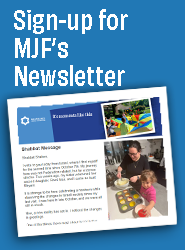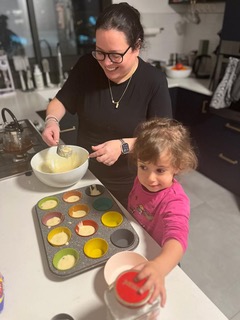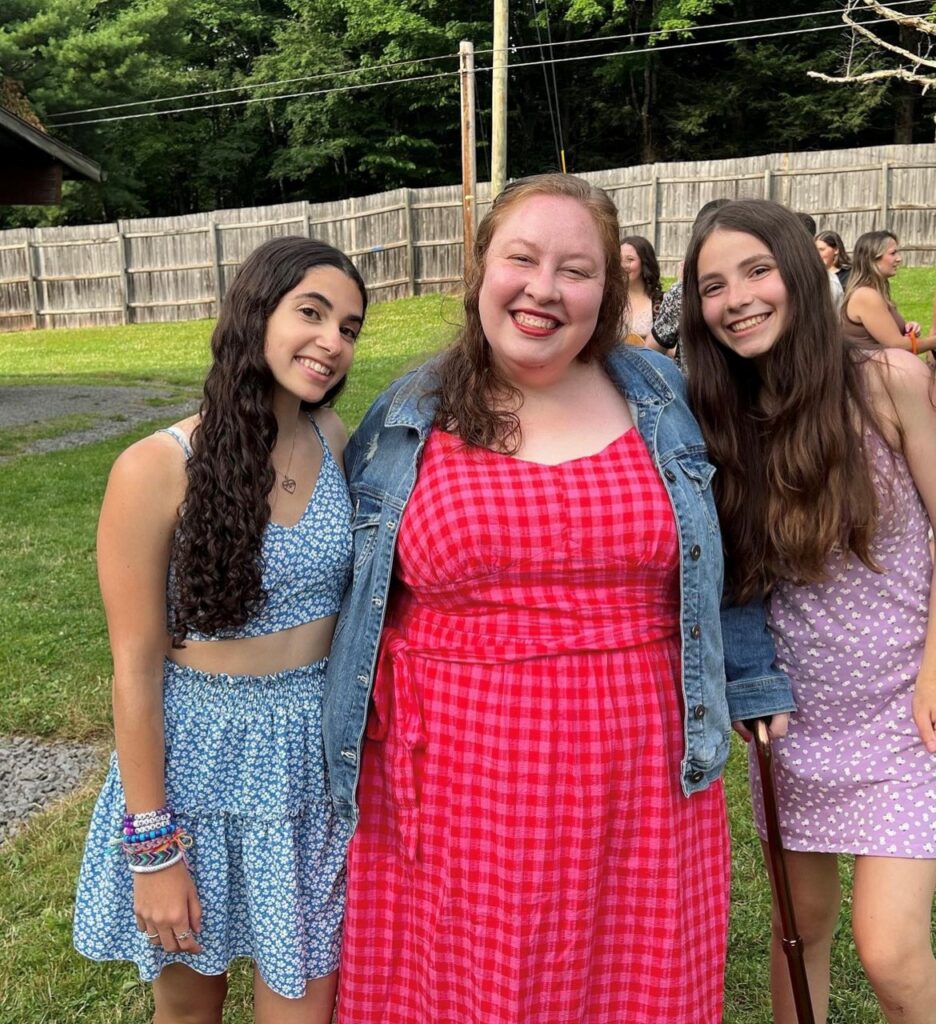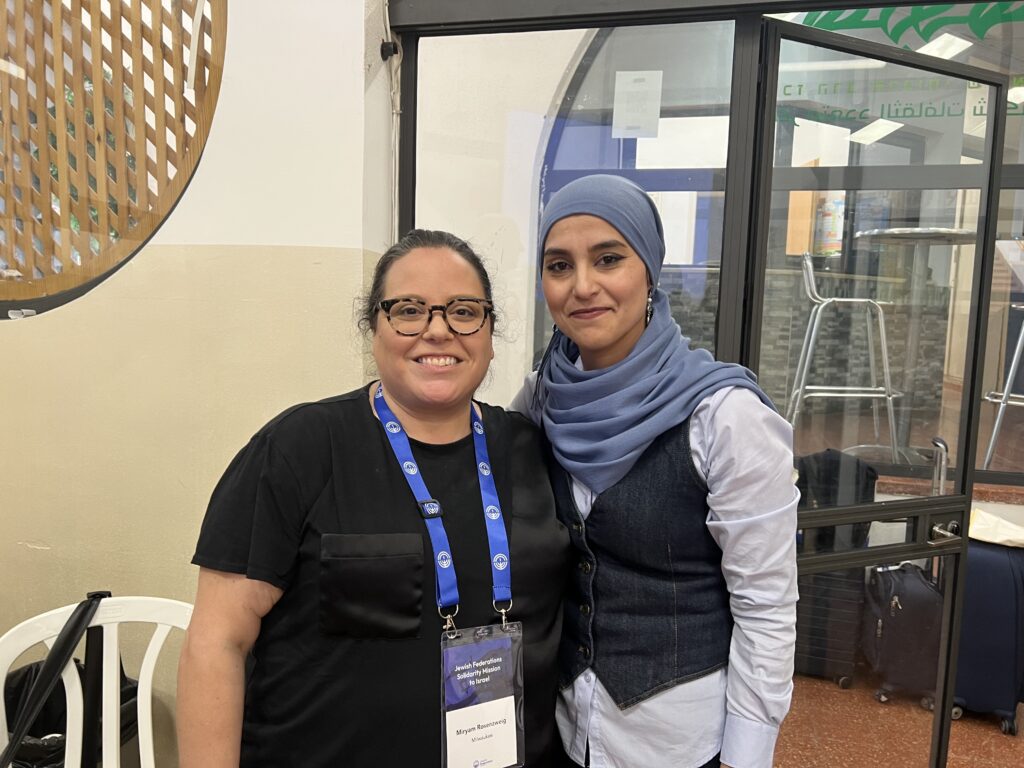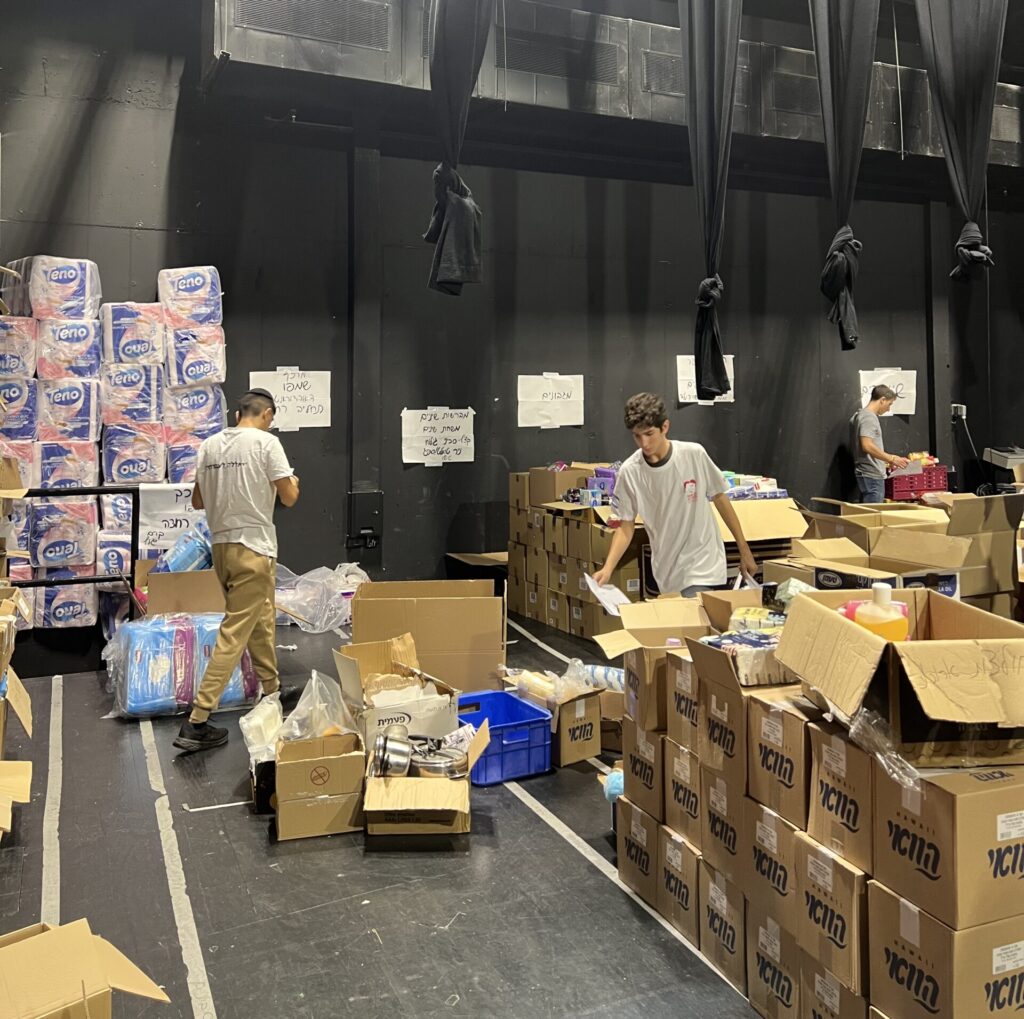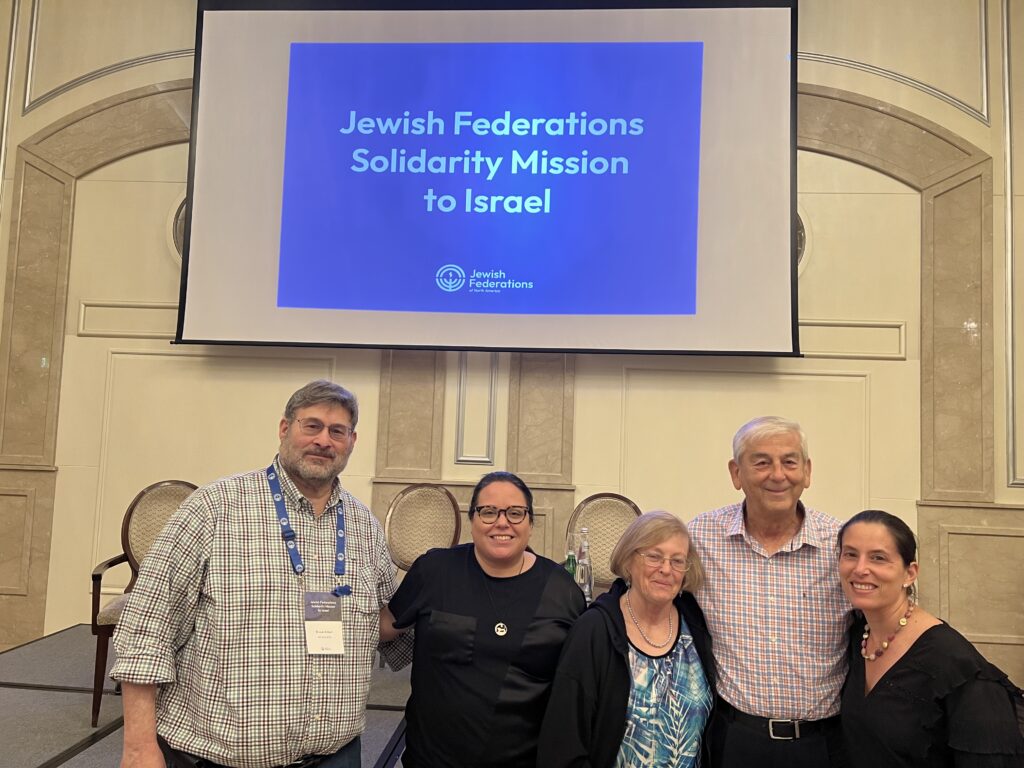
Shabbat Messages
Miryam Rosenzweig, MJF President & CEO, in addition to other community leaders, will be providing a Shabbat message as part of the MJF newsletter. Check back for the latest message to the community or sign up for our newsletter.
September 20
Guest Shabbat Message
Andy Bachman
Hate in Milwaukee
We Need Leaders, Not Dividers
The closest I ever came to a Nazi flag in my youth growing up in Milwaukee was when the National Socialist Party of America decided to march on Skokie, Illinois in 1977. The Nazis chose Skokie because of its Jewish population, including a disproportionately large number of Holocaust survivors— the fortunate Jews who had escaped Nazi persecution by luck, grit, resistance and the aid of Righteous Gentiles who risked their own lives to save their neighbors.
I was fourteen years old and the free speech debate about the Nazis constitutional rights to march and wave the flag captivated debate among Americans across the political spectrum. The American Civil Liberties Union argued successfully before the Supreme Court of the United States for their right to free speech, however traumatizing and objectionable the expression of that right was, and the Nazis marched.
I can still recall the conversations with my father who, with thousands of other Milwaukeeans, served his country to defeat Hitler during the Second World War; and my grandmother, a Jewish refugee from Minsk who fled Tsarist pogroms in 1903 and made Wisconsin her home. The blatant antisemitism of the Nazis was an abhorrence. My father and grandmother’s anguish in seeing the Nazis’ right to march under a swastika defended by court felt wrong. But I’ll never forget my father saying to me in the aftermath that if speech is sacred, then so is the power of education to counter hateful ideas. Fight words with words, he said.
Imagine my revulsion, then, at driving through Milwaukee on a recent visit home, and seeing the despicable and antisemitic mural equating the swastika with the Star of David, posted on the private property of Ihsan Atta, a Palestinian businessman and activist. While purportedly a protest against Israeli policy in its war against Hamas in Gaza, Atta’s mural is a bigoted smear on all of Judaism. It is not, as his message states, “the irony of becoming what you once hated.” Rather, Atta has purposely distorted Judaism into Nazism, an ideology that decimated Jewish life in Europe during the Holocaust. His analogy is not ironic but repulsive and overtly antisemitism. Rather than share his grief over loss of life, Atta has resorted to hate.
Since the early 7th century B.C., the Star of David has been a symbol of Judaism throughout the ancient Near East. From the late Iron Age into the Babylonian period; from the Roman conquest and on into the Middle Ages, wherever Jewish communities and houses of worship were to be found, the Star of David was an unmistakable sign of Jewish presence. Christian and Muslim authorities recognized it as such, even referring to it in countless sources in Arabic as the “seal of Solomon.” In fact, the star is seen as magical, an amulet against evil, and a positive talisman for safety and protection.
But it was not until the rise of Adolf Hitler and the Nazi regime that was responsible for the mass murder of six million Jews (including two million children) that the Star of David became a mark of death: the infamous yellow star, which the Nazis forced Jews to wear in the ghettos and concentration camps of extermination to identify the Jews and mark them for death.
Students of history know that when the swastika met the Star of David, it was a death sentence for the Jew and that in British Mandate Palestine, there was a Muslim leader fanning those flames. Seeking an alliance with Hitler to rid the Middle East of Jews, Hajj Amin al-Husayni, the Grand Mufti of Jerusalem, was received by Hitler in Germany during World War Two with the stated aim of both Hitler and the Grand Mufti being “the annihilation of Jewry living in Arab space” and the “struggle against a Jewish homeland in Palestine.”
If the “annihilation of Jewry living in Arab space” sounds familiar to us today, then look no further than the Hamas Covenant. Its language and stated aims, made known to the world by the October 7 rape, maiming, murder and abduction of more than 1400 Israelis and nationals from more than 40 countries, is the direct descendent of the Grand Mufti’s Hitlerite aims. I challenge observers of this horrific war to read Israel’s Declaration of Independence in the light of the Hamas Covenant. Nowhere will they find such hateful and violent rhetoric. One such example: “The State of Israel… it will foster the development of the country for the benefit of all its inhabitants; it will be based on freedom, justice and peace as envisaged by the prophets of Israel; it will ensure complete equality of social and political rights to all its inhabitants irrespective of religion, race or sex; it will guarantee freedom of religion, conscience, language, education and culture; it will safeguard the Holy Places of all religions; and it will be faithful to the principles of the Charter of the United Nations.
Contrast that with the Covenant which states, quoting the Koran: “The Day of Judgement will not come about until Moslems fight the Jews, when the Jew will hide behind stones and trees. The stones and trees will say O Moslems, O Abdulla, there is a Jew behind me, come and kill him.”
So bizarre, so twisted, so hateful is this document that, like Nazi ideology, Hamas believes that Jewish Zionists seek world domination and control non-Jewish civic organizations to carry out their goals: “Zionist organizations under various names and shapes, such as Freemasons, Rotary Clubs, espionage groups and others, which are all nothing more than cells of subversion and saboteurs. These organizations have ample resources that enable them to play their role in societies for the purpose of achieving the Zionist targets and to deepen the concepts that would serve the enemy.” It is the Hamas Covenant which equates Zionism with Nazism. Is this the company Atta claims to keep?
This kind of rank and hateful paranoia, with parts lifted almost verbatim from the conspiratorial and universally debunked Protocols of the Elders of Zion, would be laughable if it did not result in Hamas’s murderous and genocidal rampage of October 7 – the killing of Jews for the crime of being Jewish.
Which is exactly what Hitler did, under the swastika and the Nazi flag.
To be clear, I share Ihsan Atta’s anguish over the loss of innocent life in Gaza; is it too much to ask that Atta extends his humanity to the loss of Jewish life as well? For the sake of the preservation of human life, I want a return of the hostages and a ceasefire; can Atta say the same?
I still believe most Israelis and Palestinians want to live in peace. But when Hamas uses its own people as human shields in schools, hospitals and mosques while engaging in an eliminationist war against all Jews; and Hamas allies here in the states use Hitlerite imagery to tar Jews with the most vile of antisemitic tropes, then we must speak up for the humanity of all, educate all who will listen, and work tirelessly for the peace, understanding and acceptance that all of us deserve.
About the author: Andy Bachman is a rabbi and writer living in Portland, ME. He has served Jewish communities in New York, the South and the Midwest for over 30 years.
July 12 (click to expand)
Miryam Rosenzweig
President and CEO
Milwaukee Jewish Federation
Dear Jewish Milwaukee,
As we enter Shabbat we are already seeing guests come in for the Republican National Convention which is being hosted in Milwaukee next week. This means tens of thousands of visitors will explore and enjoy our wonderful city, but it also means there will be streets closed, traffic back-ups, limited access to parts of the city, and of course the potential for increased incidents of antisemitism.
I wanted to update you on the work that has been done and resources that are available to you or anyone in Milwaukee over the next week.
Security: the Milwaukee Jewish Federation has been working side-by-side with local and national law enforcement and our colleagues throughout the Jewish community for weeks to prepare our staffs and facilities both for the increased traffic and crowds but also the potential for antisemitic or anti-Israel incidents or activities.
Ari Friedman, VP of Security and Facilities led a broad agency briefing this week complete with a current threat assessment and action steps organizations can take to keep their staff and facilities safe.
Protests/Counter Protests: we want to remind our community that there will be many groups from both sides of the political spectrum who will be protesting. We strongly advise the community against joining any protest – it is neither effective, nor helpful and in fact often actually makes our community less safe.
Reporting: if you see something or experience something antisemitic PLEASE use our reporting tools to let us know. To report an antisemitic incident, fill out this form or CALL 414-967-SAFE. Any information you send to the Jewish Community Relations Council is Strictly Confidential.
Kosher food: Chabad has arranged to be on site within the security zone and will have both access to Kosher food and minyanim. For more information go to https://www.chabadmke.org/
Wishing you a Shabbat Shalom V’shaket, a shabbat of peace and quiet!
Miryam
June 28 (click to expand)
Miryam Rosenzweig
President and CEO
Milwaukee Jewish Federation
Shabbat Shalom!
Chazak, Chazak, V’nitchazek. Let us be strong, let us be strong and let us strengthen each other. These words are said each year as we conclude the cycle of reading of the Torah, the five books of Moses. It’s a call to utilize the strength to study more Torah.
We then immediately start over, with Genesis and begin the cycle again.
Today, we are ending a different cycle, the Milwaukee Jewish Community’s 2024 Annual Campaign. When I look back at the year we’ve all had, and when I consider all that we’ve asked of our community and all that our community expected from us, I am just overcome with pride in the enormity of Jewish Milwaukee and its accomplishments. Today, I’d like to kvell about the fundraising:
First, the Annual Campaign exceeded its $7.0 million dollar campaign goal (at the writing of this message, together we surpassed $7.1 million!), capping an incredibly generous year of philanthropy. Second, our community raised an additional $5.3 for the Israel Emergency Fund and added $6.8 million to Donor Advised Funds at the Jewish Community Foundation. When adding endowments managed by the Jewish Community Foundation, supplemental funding for security and programming, we raised an incredible total of $21,154,467 dollars! Chazak, Chazak, V’nitchazek! Let us be strong, let us be strong and let us strengthen each other!
You did this. You recognized the continuing need to prioritize Jewish giving particularly at this challenging time. And while raising the funds needed for security and antisemitism are a top priority, they are far from the only priority your gifts support. We raise money on behalf of our community so that antisemitism and security are not the only experience of being Jewish in Milwaukee. Our schools, camps, Jewish life and learning across our many community organizations provide those important experiences for our community. Together, we keep community safer physically, emotionally, soulfully and spiritually.
I want to thank our 2024 Campaign co-chairs Max Rasansky and Susan Angel Miller for their incredible leadership in a very difficult year. They rallied volunteers and community members to ensure that our community goals were met. Thank you!
As I close, I’m reminded that just as our tradition demands that we restart the weekly Torah portion cycle immediately, we will also start the 2025 Annual Campaign immediately with Susan Angel Miller and Tanya Arbit leading the charge.
Chazak, Chazak, V’nitchazek! Let us be strong, let us be strong and let us strengthen each other!
Thank you, Shabbat Shalom.
Miryam Rosenzweig
May 17 (click to expand)
Miryam Rosenzweig
President and CEO
Milwaukee Jewish Federation
Over the past two weeks, our community joined together to commemorate two very difficult days — Yom HaShoah and Yom HaZikaron — and we did it while experiencing the horror from the statements made by UWM (deemed by national experts as the worst statement by any university in the U.S.). I commend the students and staff of Hillel Milwaukee for modeling Jewish resilience during the worst of times, and that they are still able to come through and express their Jewish values and represent our community.
My Shabbat message to you is this: Despite what may seem like a dark two weeks, I am so proud of our community who stood tall like we always do. I am proud of the amazing work and several programs we facilitated over these past two weeks that celebrate Jewish life. And I am proud of all of the amazing work we’re supporting and producing around the clock in Milwaukee, in Israel and around the world, work that is making our community better and safer. We are standing stronger together.
I can only think of one way to end a week like this one — by coming together this Sunday (May 19) at the Harry & Rose Samson Family Jewish Community Center to celebrate Yom HaAtzmaut. This year we have an amazing treat for you, an incredible, uplifting musical experience all the way from Israel – Koolulam! This collective brings audiences together in a way you just have to experience, and they’ll be helping to get us ready for the second part of our day, our Walk for Israel. And, of course, we’ll cap the day off back at the JCC with food trucks, games and friends. It’ll be a day to celebrate, a day to rejuvenate, a day for solidarity and peace. RSVPs are required, but the events are free.
I look forward to celebrating together with you.
Am Yisrael Chai. The people of Israel live.
Shabbat Shalom, Miryam Rosenzweig
April 22 (click to expand)
Miryam Rosenzweig
President and CEO
Milwaukee Jewish Federation
I’ve struggled writing this Passover message. How can I wish a chag sameach- a joyful holiday- right now? How can I ignore the list of reasons that could make it hard to feel joyful?
As some may know, when I need inspiration, I turn to Rabbi Lord Jonathan Sacks Z” L. He discusses the Magid portion of Seder, in which we tell the story of Passover. He notes that our story begins with “Ha lachma anya- This is the bread of affliction” but ends with “Next year in Jerusalem.” Rabbi Sacks writes:
“What is distinctive about Jewish time is that we experience the present not as an isolated moment, but as a line in a chain connecting past and future. The very fact that [we] had been liberated in the days of Moses gave our ancestors confidence that they would be liberated again. The Jewish people would return to the land of Israel. Here we see one of the most profound instincts of the Jewish mind: memory is the guardian of hope. Those who forget the past become prisoners of the present. Those who remember the past have faith in the future. We can face it without fear, because we have been there before.”
It’s as if Rabbi Sacks wrote these words for me. They tied together all I have experienced in the last few months and made them meaningful.
I recently returned from a Federation mission to Poland and Hungary. Our mission included not only the devastation of the Holocaust but also learning about the centuries of flourishing Jewish life in Poland that preceded and followed it. We saw our Jewish values on display when we learned how the Krakow JCC supports Ukrainian refugees. And, in Hungary we learned about the horrors of Nazi and Hungarian antisemitism, but we also met incredible young Jews who are creating and celebrating Jewish life after decades of communism prevented their parents from ever learning about Jewish tradition and culture.
That week, we witnessed the link in the chain of Jewish memory and hope: what is lost, what is rebuilt, and the fierce fight to ensure that with hope, we can move forward.
This past Friday night, a new link was created in my chain of Jewish hope. I joined Hillel Milwaukee as they celebrated the first-ever campus Shabbat at Marquette. Joan Lubar, MJF Board Chair, joined us as we came together for a Shabbat service and meal with the Jewish students, university president, faculty,
and friends. As the service ended, we said Kaddish—the mourner’s prayer. I choked up.
I am still in my year of Kaddish for my father, and in the last few months, I have said Kaddish at both Kfar Aza when we said Kaddish for those lost on Oct 7th and in Auschwitz, when we said Kaddish to the over 1 million Jews murdered at this one death camp. At Auschwitz, I said Kaddish for my grandfather’s first family – his wife, children, brothers, sisters, and entire extended family that perished. These Kaddish moments were hard, but I know my grandfather had hope. He started again. He remarried, had children, and continued to live. He had faith in the future,
And on Friday night, as I said Kaddish at the Marquette Shabbat, I was surrounded by young adults who refused to be afraid. Young adults who celebrated Shabbat and Israel Week regardless of the hostile environments they faced on campuses. They persevere; they found hope and joy. That is what I want to take into Passover. These students are dedicated to ensuring the future of Judaism even in really hard times.
That is what Passover is about for me this year. We remember the hard times and eat the bread of affliction, but we end our Seder with hope, with a 2000-year-old hope- next year in Jerusalem.
“Those who forget the past become prisoners of the present. Those who remember the past have faith in the future. We can face it without fear, because we have been there before.”
I have faith in the future. Next year in Jerusalem
Chag Sameach.
Miryam Rosenzweig
March 22 (click to expand)
Miryam Rosenzweig
President and CEO
Milwaukee Jewish Federation
Shabbat Shalom,
This Saturday, the Jewish community will be celebrating Purim, the happiest holiday of all the Jewish holidays. Look at how we celebrate — with costumes, but Purim isn’t the Jewish Halloween. It’s not about ghosts and scary moments. Our costumes are funny, pun-filled, or Queen Esther. We give each other Mishloach Manot, or gift of food because food giving is the Jewish love language. We offer to those in need, an act of philanthropy and of loving humanity. We even have fun reading the Megillah. It’s interactive, you get to yell or “boo” or make noise with a grogger every time you hear Haman’s name.
This year, I’m thinking about all this joy and it seems strange. The story of Purim has been called the birth of antisemitism and demonization of Jewish people. Why would we celebrate with so much joy? Passover is also a story that ends in redemption; why is Purim the fun and joyful holiday?
I thought a lot about this question as Joan Lubar, MJF chair of the board, and I led a solidarity mission to Israel last week. Fourteen incredible Milwaukeeans arrived to stand with our brothers and sisters, volunteer, and learn where our Israel Emergency Fund dollars were invested.
Purim is a national holiday in Israel, and signs are everywhere. We saw hamantaschen booths for sale (the poppy flavor is the best!). I had a serious conversation about how to make a sun costume for a toddler. When we walked into an Absorption Center in Be’er Sheva with newly arrived Jewish Ethiopian Olim, we were greeted with “mishnichas Adar marbim b’simcha.” When Adar begins, we increase our joy. And the absorption center was joyous!
At the same time, signs of the pain and trauma were everywhere. At every location, signage towards bomb shelters was visible, and every person told us their connection to the hostages in Gaza and their families, friends, and colleagues who were affected on Oct. 7, the war in Gaza, and the impact of the evacuations from the northern borders of Israel due to ongoing issues from Hezbollah. We recognized that even our guide, hamantaschen seller, hotel security, and lecturer were navigating through their trauma as they were working.
How do we reconcile Purim and so much pain at the same time?
Rabbi Lord Jonathan Sacks says about Purim, “The Jewish response to trauma is counterintuitive and extraordinary. You defeat fear with joy. You conquer terror by collective celebration … Precisely because the threat was so serious, you refuse to be serious — and in that refusal, you are doing something very serious indeed. You are denying your enemies a victory. You are declaring that you will not be intimidated. As the date of the scheduled destruction approaches, you surround yourself with the single most effective antidote to fear: joy in life itself.”
We saw this in action. Our community dollars are helping those in trauma find joy. We visited Tiberias in our partnership region. Thousands of evacuees from towns bordering Lebanon have arrived in the region. We heard about the effects — businesses shut down, people living in hotels for more than five months, and the danger to teenagers who were more likely to use drugs and alcohol in this foreign environment.
And then we saw the Northern Schools for Evacuees. A school that was built in six weeks to house 800 students. These students were evacuated at the start of the school year, and schools in Tiberias did not have space for all of them. Getting the kids into a learning environment was paramount for their education and mental health. The school was a parking lot in October; today, the brightly painted
prefabricated boxes are classrooms. The infrastructure was built by the government and our community. Israel emergency dollars were invested in the school and helped with the supplies needed for the classrooms. The kids were joyful. They were thrilled to be in classrooms with their peers. They told us that it feels normal, at least when they are in school. These teens have been out of their homes for five months and found joy in getting to class. Some of the school’s teachers came from evacuated communities, but others were retired teachers in the area who came to serve and help those kids. It’s a happy school. It has a logo. It has decorated walls, school bells, and an Astroturf area to play in. It also has a bomb shelter for every two classrooms: the joy and the pain.
As we prepare for Purim, this Shabbat, let’s remember this message. Together, we can bring joy and move people beyond the pain to find moments of happiness. Let’s rejoice in our Jewish community and all it has to offer, and all that we can offer each other.
Shabbat Shalom,
Miryam Rosenzweig
March 8 (click to expand)
Guest Shabbat Message
Deb Carneol Fendrich
Director of Women’s Philanthropy
Milwaukee Jewish Federation
Shabbat Shalom and Happy International Women’s Day!
Today, March 8, is International Women’s Day, which is a day dedicated to honoring the achievements and contributions of women worldwide and celebrating the strength, resilience, and determination of women throughout history who have paved the way for progress and change.
As we prepare for Shabbat to begin later this evening, I cannot help but think about the Jewish roots of International Women’s Day. Theresa Serber Malkiel was a Jewish immigrant from Ukraine who became a prominent figure in the fight for workers’ rights in the United States. It was her (and likeminded women’s) spirit of solidarity and activism that laid the foundation for International Women’s Day. Like Theresa, today, we have trailblazers of our own in Tanya Arbit, Women’s Philanthropy Chair, and Becca Guralnick, Women’s Philanthropy Campaign Chair.
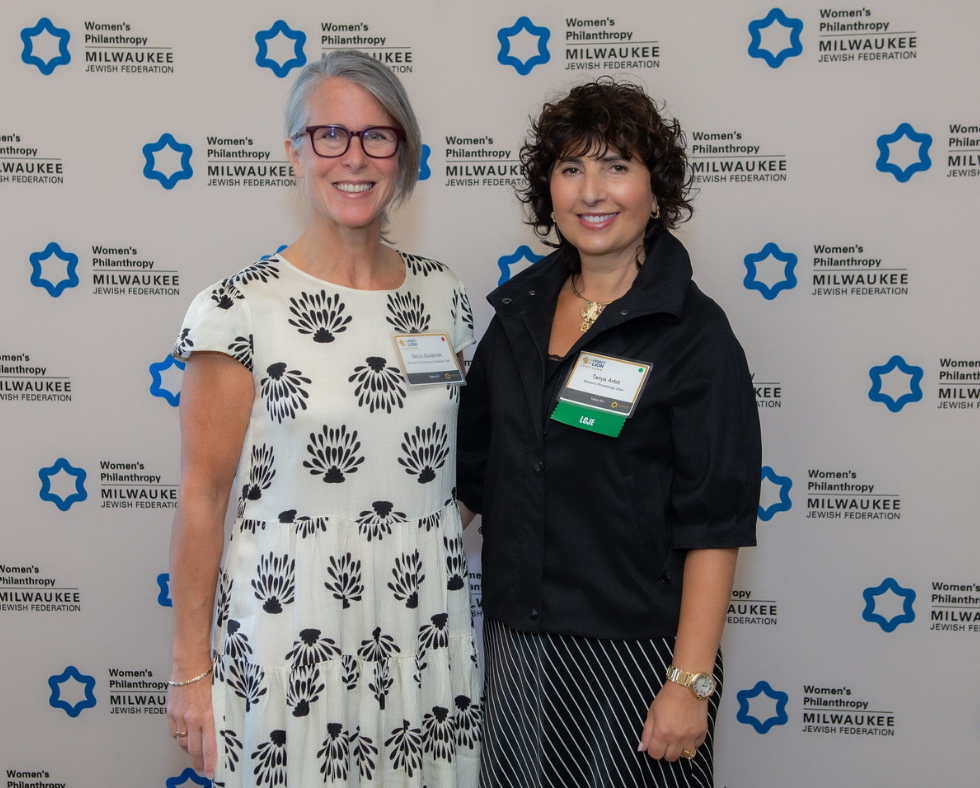
Tanya has been volunteering in an advocacy role for years now. As a Jewish Ukrainian woman living in Milwaukee, this advocacy was truly highlighted when the war broke out in Ukraine and Tanya became a central figure in the MJF response to the war. Today, Tanya is currently in Israel, and along with other MJF leaders, will be bearing witness to the atrocities that occurred on October 7 that will further empower her advocacy. Becca was one of the first leaders in our community on the ground in Israel post October 7 – volunteering and comforting friends and family. More than that, she is leading our annual campaign efforts. With Becca’s guidance and passion, our community’s women have already contributed over $1 million to our annual campaign.
On a national level, Women’s Philanthropy has been a pioneer for the North American Jewish community. It has led in fundraising for annual campaigns, advocated for the rights of Jews around the world, and taken up leadership positions within the community. In a day and age where women’s rights were not fully realized like they are today, Women’s Philanthropy was ahead of its time, giving women the tools to be philanthropists, create endowments, be on a board, even chair a board, and make their voices heard.

According to the Women’s Philanthropy Institute out of Indiana University that studies ALL women, women are earning more than 50% of bachelor’s, master’s, and doctoral degrees worldwide. Women also now hold around 40% of global wealth. They are predicting that women leadership and philanthropy will explode over the next two generations.
As experts in women’s leadership and philanthropy for the last six decades, Women’s Philanthropy in Milwaukee is set to empower and inspire women to actuate these passions as we endeavor to help take care of the needs of the Jewish community and build a vibrant Jewish community here in Milwaukee, Israel, and around the world.
Shabbat Shalom,
Deb Carneol Fendrich
Director of Women’s Philanthropy
February 9 (click to expand)
Miryam Rosenzweig
President and CEO
Milwaukee Jewish Federation
Shabbat Shalom,
I write to you today from Israel, where I find myself for the second time since October 7th. My journey here was not Federation-related, but for a joyous simcha. Two weeks ago, my sister welcomed her second daughter, Romi Noa, and I came as Aunt Miryam.
It is strange to be here celebrating a newborn while observing the changes in Israeli society since my last visit. I was here in late October, and we were all still in shock.
Now, a new reality has set in. I noticed the changes in greetings.
One of the things I love most about Israel is that you are greeted with a hearty Shabbat Shalom everywhere you go. Starting on Thursday, Israelis no longer greet each other with just “shalom” but instead signal the weekend in the most Jewish way possible — by saying Shabbat Shalom. “Shalom” is a word that encompasses not only peace but also harmony and completeness.
Yet, I noticed that daily salutations have taken on a different note. No longer is “shalom” the hello/goodbye greeting. It’s too big, there is no harmony, and the country is acutely aware that there is no completeness right now. Instead, Israelis wish each other to have a “Yom tov v’shaket” — a good and QUIET day. Israelis are quite aware that every person has no idea what the other is going through. Some are dealing with family members who are fighting in the IDF, others are dealing with being displaced from their homes, some with missing family and friends, and many with the looming threat of a missile alert on their minds.
Have a quiet day is the new normal. It doesn’t dismiss or obscure what the other may be going through, yet it offers some comfort. May you have a day in which you don’t have to deal with something that disrupts whatever gives you peace. Shalom.
As I think about the tranquility of shalom, I smile as I’m reminded of the special familiar greetings that happen in Israel. This week, I walked with my niece to the makolet, the corner store. Roni, the shopkeeper saw Libby, my 2-year-old niece, and said to me, “You must be the sister from chutz la’aretz (outside of Israel). Did your sister have the baby? How is she? How is the baby? You’re shorter than her.” He then turned to Libby and told her to remove her pacifier because only “big girls come to the makolet” and he doesn’t allow pacifiers. She immediately obliged because she knew he was going to let her have a piece of candy. I smiled. He acted like family, concerned about the health of my sister, letting me know I was shorter, and directing a toddler about a pacifier.
That’s Israel too. The incredible familiarity that exists. We are all one mishpacha here. We have to be. We know that at the end of the day, we are in this together for the long run, all of us. We are mishpacha and that’s how family is (boundary conversations are for a different message).
So, this Friday, I wish you, my Milwaukee mishpacha, a Shabbat Shalom V’shaket — a Shabbat of peace and quiet. May this Shabbat be restorative to us all, as together we take care of each other in Milwaukee, in Israel and around the world.
Shabbat Shalom,
Miryam Rosenzweig
January 26 (click to expand)
Guest Shabbat Message
Samantha Abramson
Executive Director
Nathan and Esther Pelz Holocaust Education Resource Center
Shabbat Shalom,
Tomorrow, January 27, is International Holocaust Remembrance Day — a date designated by the United Nations to mark the anniversary of the liberation of Auschwitz-Birkenau and to honor the six million Jewish victims of the Holocaust and millions of others.
Like so many commemorations, holidays, and lifecycle events since the October 7 Hamas terrorist attacks, this year’s International Holocaust Remembrance Day feels different. As both a Holocaust educator and a member of the Jewish community, I have been appalled in recent months at the blatant antisemitism rampant on social media, in the news, in our schools, and even in places where I least expected it – from trusted partners and friends.
Adding to the complexity of International Holocaust Remembrance Day this year is the fact that it is a global day of remembrance established by the UN – the same UN that has minimized and dehumanized the suffering, murder, and rape of Israelis at the hands of Hamas, and the same UN that announced today its interim decision on the case filed in the International Court of Justice by South Africa, who is accusing Israel of perpetuating genocide.
In these challenging times, I find myself listening to HERC’s incredible collection of Holocaust survivor testimonies. Their stories provide a lens into the best and worst of humanity – and command the listener’s active attention. As I pour over testimony after testimony, I feel angry, sad, depressed, connected, passionate, and empowered. For our HERC team, this is not a completely surprising blend of emotions. Indeed, we shepherd thousands of students every year through the once-in-a-lifetime experience of hearing a Holocaust survivor speak, and we observe these transformations before our eyes.
I am in constant awe of the Holocaust survivors and their family members, who selflessly and with profound pain share their stories of suffering, survival, resilience, and hope again and again, because they KNOW firsthand the dangers of unchecked antisemitism and hate. Their eyewitness accounts of the Holocaust as it unfolded help safeguard our present and future world from Holocaust denial, and remind us that the Holocaust didn’t happen all at once to millions of people: it happened millions of times to individual men, women, and children, deliberately targeted because of their identity. As historian Dr. Peter Staudenmaier will share during HERC’s International Holocaust Remembrance Day lecture on the Weimer Republic this Sunday at the Polish Center of Wisconsin, the Holocaust happened because of decisions and actions taken by ordinary people.
Despite what any credible English professor would tell you, remembrance is a verb, not a noun. According to Holocaust survivor and Nobel laureate Elie Wiesel, “Action is the only remedy to indifference: the most insidious danger of all.”
As we gather as a global community to remember the Holocaust during these most urgent of times, I hope that however you choose to commemorate leads to a re-commitment to Holocaust education. We need the wisdom of Holocaust survivors now more than ever, and as a study released by the Claims Conference this week reminds us, our time to learn from them directly is running out.
Shabbat Shalom,
Samantha Abramson
2023 (click to expand)
December 29 (click to expand)
Miryam Rosenzweig
President and CEO
Milwaukee Jewish Federation
Shabbat Shalom,
Everywhere in Israel, you will see one slogan appearing on billboards, street signs, bus stations, TV, and T-shirts. There is even a song for this slogan. “B’yachad Nenatzeach” — “Together we will win.” In Israel they know that we can’t get through this difficult time by focusing on what divides us. The only way we get through this is B’yachad — together.
Scott Kaufman, a great Jewish communal thought leader, would often say to me that “Jewish is a team sport, you can’t play it alone.” When you think about it, every part of our structure, culture and tradition requires B’yachad — together. We pray in a minyan, a gathering of at least 10 others. We mourn together in Shiva. We even dance together when we hora!
I learned the power of this togetherness this summer, when my father, Rabbi Yosil Rosenzweig, passed away. I experienced the healing power of togetherness. Even though I have worked in community settings my whole life, it was in my darkest hour that I learned about community.
Just a few months later I witnessed the strength of unity as Jewish Milwaukee responded to October 7th. We gathered, we hugged, we acted, we marched, we donated. B’yachad — together.
No one individual or institution can do it alone. Community is a team sport. It takes all of us.
Over the past few months I have had conversations with those who feel afraid. Yes, we are witnessing the most significant rise in antisemitism in my lifetime. I’ve heard some express fears of the past.
It is now that we must remember that we are not isolated. We are not alone. We are together!
The Jewish world is more organized today than it has ever been. We are organized locally and nationally. We’ve been doing this here in Milwaukee since 1902 when the Jewish Welfare Fund took communal responsibility for the needs of Jewish Milwaukee. We do Jewish B’yachad.
Yes, our campuses are feeling the strain of antisemitism, but they are not alone. They have Hillel. And Hillel has all of us. We fight together. B’yachad.
Yes, we worry about kids, what it means to be Jewish and the future. Our children are not alone. They have BBYO, day schools, JCC programming, synagogue family programming, PJ Library, and even Jewish summer camp to look forward to. All those programs have us. We help our kids together. B’yachad.
Yes, the needs in Israel are tremendous, it will take years to recover. They are not alone. We, the Milwaukee Jewish community, has raised almost $5.2 million in the last 2 months. We are not alone — we are joined by 146 Federations nationwide and collectively we have raised $780 million to support Israel. We did that B’yachad.
That’s how we do Jewish.
I am hopeful as we approach 2024. I know that together, we will continue to support and raise funds for Israel, fight antisemitism, keep our campuses safe, support education and camps, help our most vulnerable, and make sure that no Jewish person is afraid to live and be Jewish in Milwaukee. Together, we will continue to grow, support one another, and foster a community that will thrive for generations to come.
B’yachad Nenatzeach. Together we will win. Am Yisrael Chai.
Shabbat Shalom,
Miryam Rosenzweig
December 15 (click to expand)
Guest Shabbat Message
Tziporah Altman-Shafer
Director of Israel & Overseas
Milwaukee Jewish Federation
Shabbat Shalom,
We are living in strange times. On the one hand, our hearts and minds are filled with the pain of the hostages, the Gaza War, and rising antisemitism in Milwaukee and around the world. On the other hand, we are witnessing achdut, Jewish unity on a level not seen in a generation. I have seen this unity firsthand: the community gathering on Oct. 9, our mission to Washington, D.C. for the rally, and many community Chanukah celebrations. At the end of November, I traveled with 27 members of Women’s Philanthropy on a mission to Mexico City. These experiences were unique in their content, goals, and location, but they shared a sense of community purpose and unity. They filled me with hope, pride, and love.
In Mexico City, the little things brought me such joy. Every time we sat down (on the bus or at a restaurant), the women made an effort to engage with someone new. Conversations ranged from family life, to what we were seeing in Mexico, to the situation in Israel. By the end of the trip, women not only opened their hearts, but also their wallets: we had three new Pomegranate Society (donating $1,800 to the Annual Campaign) and two new Lion of Judah members (donating $5,000 to the Annual Campaign). The trip was short but left us feeling like a family.
We were privileged to visit the ORT Olami School. This school, with 1,200 students in preschool through 12th grade, was pulsing with energy. In Mexico City, 96% of Jewish children attend Jewish day schools. When we attended their Shabbat Sing, I thought, “a day school is a day school, wherever we are.” Seeing the amazing resources this school has because of their connection with World ORT, a program supported by the Milwaukee Jewish Federation annual campaign, I was so proud to know that our work in Milwaukee contributes to the success of this school.

We saw Israel signs, like the one below that says “stronger together” all around the school. The school has welcomed 22 Israeli families with connections to Mexico; all the students are integrated into existing classes and are attending the school for free this year. They have also brought in 25 teens for a few weeks of respite; they have their own program at the school.

We visited the CDI-Centro Deportivo Israelita (Mexico City’s JCC). Their 12-acre campus includes many buildings, sports fields, swimming pools, and a brand-new senior living structure. More than half the Jews in Mexico City belong to the CDI. It was inspiring to see hundreds of people enjoying a multitude of activities around the campus. Again, we saw many posters supporting Israel.


Chanukah brought us light in the darkness. Being with our community, whether in Milwaukee, Washington, D.C., or Mexico City, also brings light. In the coming days and weeks, how will you bring light to those around you? I hope everyone will join me in bringing light by showing our Jewish unity and pride.
Am Yisrael Chai. Shabbat Shalom.
December 1 (click to expand)
Miryam Rosenzweig
President and CEO
Milwaukee Jewish Federation
Shabbat Shalom,
With Thanksgiving just a week behind us, stores are filled with holiday decorations. As I walked by Metro Market’s blue stand with obligatory menorah plates, blue decorations, and, of course, Chanukah socks, I began to wonder. How do we celebrate such a happy holiday this year? Can we celebrate while our brothers and sisters in Israel are suffering? When there are hostages? When we are worried about antisemitism? Am I even in the mood for a Chanukah party? Latkes? Sufganiyot? (Yes. I was ready for sufganiyot.) Everything else? I wasn’t sure. So, I had to do some Jewish learning.
What is this holiday about? The story of Chanukah tells us of the Maccabees’ victorious struggle against the Greeks, granting the Jewish people in Judea the freedom from Greek rule and the ability to practice their religion once again (to learn more about this, Google – “Why do we play dreidel?”)
Yet, the enduring symbol of this holiday is not the Maccabean sword or some battle cosplay, but the menorah or chanukiah. The menorah moves the focus from the miraculous war to another miracle that occurred — an ordinary jug of pure olive oil, meant to last for only one night, burned brightly for eight nights. This allowed the Jews to celebrate their Jewishness once again.
The beauty of Chanukah lies in the symbolism of the menorah itself. When one candle lights another, its light is not diminished; instead, the two candles illuminate even more from the darkness. This is precisely how our community functions as well. Each of us is like an individual candle, but together, we can banish the darkness that surrounds us.
Since our world shattered on Oct. 7, our community has come together in unprecedented ways to banish the darkness together.
Our first community gathering on Oct. 9 drew 1,000 people in person and 2,500 online, representing all segments of Jewish Milwaukee. Subsequent events, including music nights, mitzvah days, Tehillim gatherings, and mindfulness sessions, have allowed us to come together with intention, offering many avenues for connection and spreading light throughout our community.
Our community came together with incredible philanthropy. Close to $5 million has already been raised for our brothers and sisters in Israel through our Israel Emergency Fund. Countless individuals and foundations have stepped forward, offering additional direct support to programs in Israel. In addition, increased funding for local needs, such as enhanced security measures, campus needs, and local programming, has been invested. These dollars are beacons of light to the lives of displaced families in Israel and our local community at home this Chanukah.
One of the most powerful expressions of unity was the historic March in Solidarity For Israel in Washington, D.C., on Nov 14. A group of 250 Milwaukeeans joined 300,000 Jewish Americans as we stood united together. This diverse assembly represented every part of our community, from various denominations and age groups to different political leanings and backgrounds. In that moment, we realized that unity is our greatest source of light and strength.
We don’t have to wait for another massive gathering for this feeling. Now is the time to participate in the many opportunities to be Jewish together through what Jewish Milwaukee has to offer. Take a class, go to your synagogue, have a bite at Hannah’s Kitchen, walk down Main Street at the JCC, invite others for Shabbat dinner or come to Shabbat Sing. Lean into those things that make you feel most Jewish and do them (even sufganiyot!). As we light the Chanukah candles this year, let us do so with a profound sense of purpose and unity. Let us remember that by coming together, we can be the light that dispels the darkness in Milwaukee, Israel, and around the world.
Happy Chanukah, Shabbat Shalom, and Am Yisrael Chai – The Jewish people live on.
Miryam Rosenzweig
November 24 (click to expand)
Guest Shabbat Message
Rabbi Wes Kalmar
Anshe Sfard Kehillat Torah
At the funeral for Rose Lubin, the lone soldier from Atlanta who was murdered guarding the entranceway to the Old City of Jerusalem, someone said that you are not a real Israeli until you know someone who has been killed. Perhaps in the current situation that harsh assessment could be updated to say that you don’t really feel the pain of the nation unless you know someone who is being held hostage. That feels real for all too many Israelis who do know someone who has been killed or taken captive.
As I write this from Israel, on a 3-day mission of RCA (Rabbinical Council of America) and RIETS (Rabbi Isaac Eichanan Theological Seminary, the rabbinic school of Yeshiva University) rabbis in conjunction with World Mizrachi, the plight of the hostages has taken the world stage front and center. With an agreement about hostage releases in exchange for prisoner releases and a pause in the fighting, I hope that by the time you read this, we will see some of the hostages returned home.
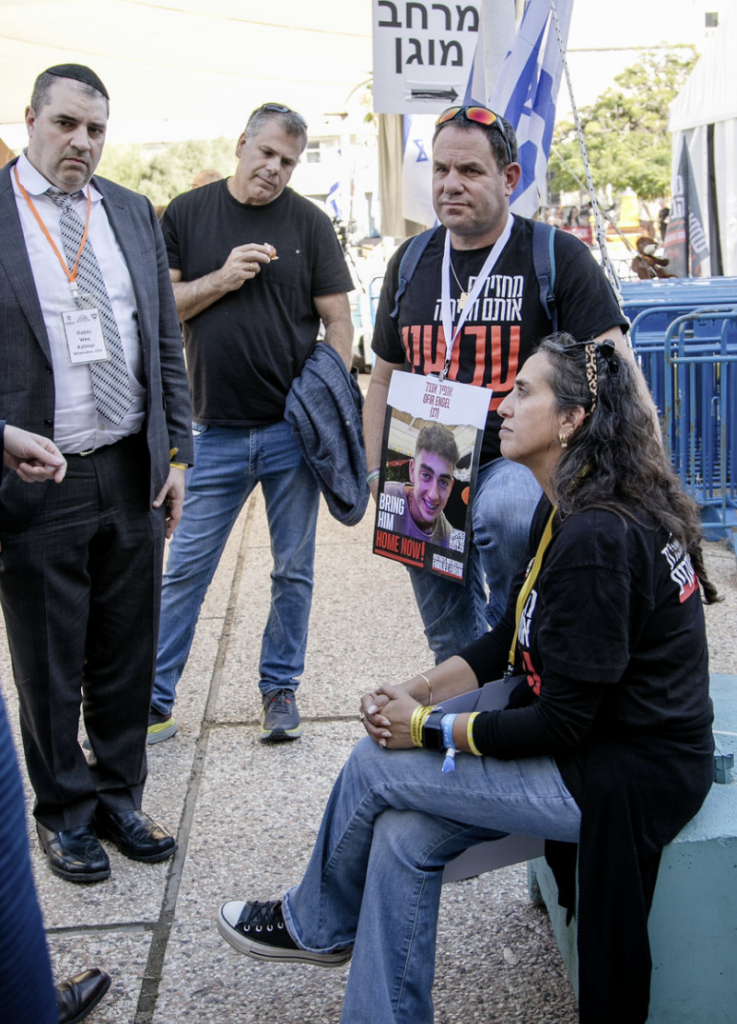
Yesterday we spent time with the families of the hostages in Dizengoff Square in Tel Aviv, now renamed Hostages Square. In the pictures here I am sitting with the family of Ofir Engel, a 17-year-old from Jerusalem who was visiting a friend in Be’eri on Oct. 7 when he was taken by Hamas. His parents, Yoav and Sharon, along with their two teenage daughters are living a nightmare that is unimaginably being shared by hundreds of Israeli families and families of people around the world.
One of the amazing things that we saw yesterday was the work of the Bring Them Home Now organization that materialized in response to the plight of the hostages. The Israeli software company Checkpoint has consolidated itself to offer three floors to the organization for its operations. Thousands of people are donating their time, some of them 24/7, on behalf of the hostages. They are working on media, social media, diplomacy, physical, emotional, psychological and other needs of the families in a coordinated and organized way which is incredibly impressive. Many people with high-powered jobs have dropped everything to assume roles in the organization. We met with the people there, including the organization Kikar Shabbat, a Charedi website in Israel that is partnering Chareidim in Israel with hostages and their families. We sang Acheinu with Yuval Haran, a resident of Be’eri whose father and aunt were killed on Oct. 7 and who has seven family members being held hostage, including his mother and sister and a nephew and niece.
Yael Danziger Sharansky, daughter of Anatoly (Natan) Sharansky, recently related a little to what it was like to grow up in the home of legendary refuseniks. She related her experience to that of Yitzchak, Isaac, who lives a life of upholding and imitating the path of his father Abraham.
In every great piece of literature or movie, there is an aspect of the leaving home story. The protagonist must leave home and make decisions about moving in a new direction which will affect his/her life.
In this week’s parsha we find Vayeitzei Yaakov – Yaakov (Jacob) must leave his home and go into the tough world of Lavan and Esav.
Yitzchak is someone who doesn’t really make any decisions in his life. He is an object in the Akeidah, he has his wife chosen for him. He is an example of Gevurah – strength – of keeping up the values of the previous generation.
Rivka however, does make decisions. She says aileich – I will go – with this servant of Avraham and marry this man I do not know – she decides for herself.
And then she decides to send Yaakov to get the blessing.
As Jews who live in the diaspora, we must ask ourselves – are we able to make decisions to step up and take on the responsibility for our fellow Jews in Israel? Can we be like a Yitzchak, upholding the ways of our forefathers and foremothers?
And are we also able to be like Rivka or like Yaakov and decide that we will take action when needed?
We are a nation that can create a sophisticated organization to save hostages in a matter of days.
What are we doing to support Israel in its time of need?
Which of the hostages have we taken the time to get to know about personally, so that we are invested in their freedom?
The Jewish people are at a crossroads. It is a time for action and decision-making.
What are you doing?
What will you do?
November 17 (click to expand)
Guest Shabbat Message
Mark Shapiro
President and CEO Harry & Rose Samson Family JCC
My father had a lot of advice to share in his too short lifetime and every now and then something really stuck. “When you have the chance to do the right thing…Do it!” and just when I thought the advice was over he added this crucial second part, “and if you are going to do it…Do it the right way.” This week I had the chance to fulfill my dad’s advice in 2 very powerful ways that exemplify our amazing Jewish Community in Milwaukee.
Tuesday morning I, along with over 200 Milwaukeeans, joined almost 300,000 people in DOING THE RIGHT THING, THE RIGHT WAY! Through the amazing work of the Milwaukee Jewish Federation we boarded a plane and joined the global Jewish community in Washington, D.C. for the March for Israel. We carried the strength and the voices of our entire Jewish community with us as we marched from the Capital Jewish Museum to the Mall, we stood with Israel (literally and figuratively) as speaker after speaker, song after song, sign after sign stayed on point – that we stand FOR SOMETHING – not against something. Chants of Bring Them Home echoed off the Smithsonian walls, flags of blue and white and flags of red, white and blue waved together as we stood with Israel and her right to exist. We stood with the hostages and their families and demanded that they be free to come home. We stood with each student on each campus and demanded that they have the right to walk to and from their classes without fear and to feel safe in this world. We demanded that antisemitism be called out for what it is, hate speech, and for our universities and leaders to say that it is NOT OK.
Thursday morning I woke up early again, and with a team of amazing volunteers and staff, we did the right thing and did it the right way at the Jewish Community Pantry. Our annual Thanksgiving distribution day was filled with sunshine, music, and hundreds of families coming to be treated with respect and given everything they would need for a complete Thanksgiving dinner. The “right thing” continued even after the last of the 125 Turkeys were given away when one of our amazing volunteers, seeing so many people still in line, went to the closest store and bought another 20 turkeys. Doing the right thing, the right way.
This week’s Torah portion is Tolodot and it shares the story of Esau and Jacob, one of the many conflicted relationships we learn about and from in the Torah. Lord Rabbi Jonathon Sacks (o.b.m.) shares in his book Lessons in Leadership, “…Parents and Leaders must establish a culture in which honest, open, respectful communication takes place, one that involves not just speaking but also listening. Without it, tragedy is waiting in the wings.” Even in the face of rising antisemitism, and calls for the destruction of Israel, our Jewish community finds a way to fulfill Rabbi Sacks’ vision through respectfully rallying for Israel and by treating all of our neighbors with dignity and respect. See dad…I was listening!
May this Shabbat be a Shabbat filled with peace, may the hostages come home and Am Yisrael Chai.

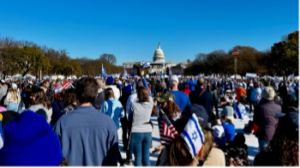
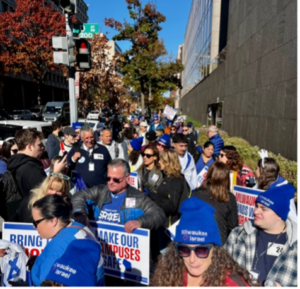
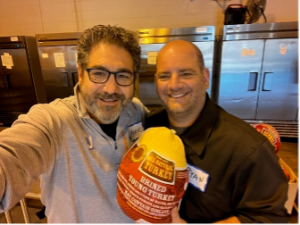
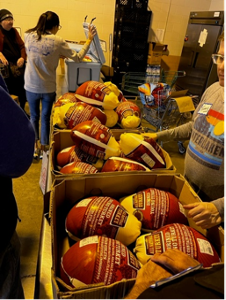
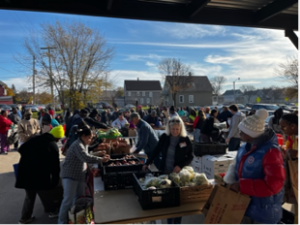
November 10 (click to expand)
Guest Shabbat Message
Sarah Yonas
Regional Director BBYO Wisconsin
This week’s parsha starts with a curious description of the matriarch Sarah’s age when she dies. “Sarah’s lifetime – the span of Sarah’s life – came to one hundred and twenty-seven years.” Genesis 23:1
Rashi believed that the double mention is important. He shared that the first half of the verse described the quantity of her years, but the second half reflects the quality of her years. Similarly, at the end of the parsha, Abraham dies at 175, and he died “at a good ripe age, old and contented.” Genesis 25:7
Abraham secures land for Sarah’s burial, and helps Isaac find his partner in Rebecca. This will help fulfill the covenant of Abraham’s people multiplying in their homeland, but it didn’t happen without hard work. Rabbi Lord Jonathan Sacks, of blessed memory, explained, “The Divine promise is not what it first seemed: a statement that God will act. It is in fact a request, an invitation, from God to Abraham and his children that they should act. God will help them. The outcome will be what God said it would. But not without total commitment from Abraham’s family against what will sometimes seem to be insuperable obstacles.”
The land and the people that Gd promised happened and continue to happen because of our hard work, and not just the work of adults. In my role with BBYO Wisconsin, I see daily the incredible work our teenagers do that help bring Gd’s promise to life. They find unaffiliated Jewish teenagers and invite them to meaningful teen-planned events. They raise awareness about issues that resonate with them over social media and in person. They stand up to injustice, and they stand together with each other in beautiful shows of solidarity.
It would be easy to crumble into a paralyzing state of mourning right now, but I am shown every day that the future of the Jewish people is strong because our teens are strong. The quantity of their years is not many, but the quality of the Jewish lives they are proudly living is exemplary. May we follow their examples to live joyfully Jewish and may we all have a Shabbat Shalom.
Sarah Yonas, Regional Director BBYO Wisconsin
November 3 (click to expand)
Miryam Rosenzweig
President and CEO
Milwaukee Jewish Federation
Shabbat Shalom,
On Saturday night I took a flight to Israel from Newark Airport.
Every seat was occupied. The plane was full.
Before the typical in-flight announcements, a special one was made. “Israel is enduring challenging times. At El AL, we’re committed to keeping the airways accessible. Our thoughts are with our soldiers, our loved ones and those missing, and we appreciate all who have come to assist. Am Yisrael Chai.”
We were a plane full of brothers and sisters who just never met each other. Conversations ensued. The passenger beside me, a music teacher, was returning to Tel Aviv. Some were on their way to volunteer, others to visit their children in Israel. One grandfather let me know that his daughter was being induced tonight in New Jersey, but he just had to go to check on the other grandchildren. I shared that I was on a mission to Israel with the Federations, and a few people clapped around me. They are proud of the effort we are making together.
Curiously, I asked a few about their ancestral origins. Within just a few rows, we had roots tracing back to Russia, Hungary, Romania, Poland, Syria, Tunisia, Egypt, and Yemen. It was a beautiful tapestry of Jewish heritage, a manifestation of the biblical promise: Kibbutz galuyot, the return of the Jewish Diaspora to Israel. The man behind me said “I’m from England but originally France, does that count?” I let him know he was part of us too tonight.
He was flying to Israel because he was a reporter for Sky News.
As we descended, a realization dawned upon me: for the first time, I was on a flight to Israel with only adults. The absence of children’s voices, especially the cries of babies, created an unsettling silence.
Our descent into Tel Aviv took an unusual route. First, we flew north, turned around and flew south to Ben Gurion Airport. After landing, the pilot greeted us, shared the local time and weather, and closed with a heartfelt wish in Hebrew, urging us to keep ourselves safe and hopeful for better news.
Ben Gurion Airport was eerily quiet, with just our flight’s passengers. Clear signage guided us to shelters and safe zones at regular intervals.
The usually bustling roads of Tel Aviv were strikingly quiet at 5 p.m. on a Sunday (a workday in Israel). Signs on the roads made heartfelt pleas for the safe return of hostages. The radio aired news continuously.
I headed to hug my family. Reaching my sister’s place, I cherished being just family – a sister, aunt, and sister-in-law.
Naturally, the war was a recurring topic. Some insights I gathered:
• Avoid showering on the hour or half-hour – prime times for sirens.
• Sirens typically sound around noon and five, but a recent daylight-saving change caught Hamas off guard, shifting the timings.
• Driving post-sunset is avoided due to visibility challenges during emergency stops.
• My niece attended school for just two days since October 7th. The risk levels recently shifted, halting her preschool again.
Despite the tense atmosphere, there were heartwarming moments. I hugged my sisters and sang with my niece. Those hours rejuvenated my soul. The next day, the solidarity mission began and I knew my short personal joy was about to end.
The mission gave me a stark wake-up call that our utopian view of Israel has gone.
What I witnessed was that:
Our people are suffering.
Our people are crying out for help.
Our people live with fear and danger every minute of every day.
At this time of grieving and suffering what can we do or say?
Some of the words I heard from survivors in Israel still echo in my ears:
“I believed my home was safe. I no longer have a home.
“I believed my parents would keep me safe. They couldn’t.
“I believed I could keep my children safe. I couldn’t.
“I believed it would never happen again. It did.”
And yet, throughout the days, the absolute spirit of the Israeli people shined through. The collective responsibility they have taken for each other is the living embodiment of Kol Yisrael aravim zeh bazeh. All Jews are responsible for one another.
One of the most striking experiences I had with that phrase front and center was my visit to Magen David Adom — Israel’s multifaceted hub for emergency medical response and blood donation. As we explored the expansive MDA facility, their prompt response during the crisis was evident, from managing 50,000 units of blood to the valor of first responders treating countless patients.
However, what struck me the most was MDA has a breast milk bank. Originally intended for NICU babies, the program has evolved under the current circumstances.
Tragically, 40 infants under the age of 6 months now rely on MDA’s milk bank. Their moms’ have been murdered, injured, kidnapped or are still missing.
Most will never know their mothers embrace again, but there are other mothers making sure these babies are being taken care of.
All Jews are responsible for each other.
I met many people who had family members kidnapped and taken to Gaza. Each story was heartbreaking. They begged us to help free them as if we had a direct line to President Biden.
All Jew are responsible for each other.
Hotel lobbies turned into distribution centers with hundreds of volunteers delivering supplies to anyone who needs them.
All Jews are responsible for each other.
There are thousands of stories and I bore witness to a few. Every story, every cry, every one of their emotions moved me and will stay with me forever.
We need to continue to support Israel and most importantly keep the 240 names of the hostages front and center.
I want to make it clear that MJF will never stop advocating both locally, statewide and nationally for their release.
We have raised over $4.4 million towards our $6 million goal. You can give to the Israel Emergency Relief Fund with the assurance that every dollar will go to help victims in Israel.
Click this link and help us reach our goal.
We all know that the weeks and the months ahead will be hard for Israel and hard for us as we see the rise in antisemitism around the world. MJF is committed to our security and to advocate for our community.
We will not be silent; we will never be silenced.
If there is one thing, I have learned from all of this, is that we are so much stronger together.
Am Yisroel Chai. Let the people of Israel live!!
Shabbat Shalom,
Miryam Rosenzweig
October 27 (click to expand)
Miryam Rosenzweig
President and CEO
Milwaukee Jewish Federation
Shabbat Shalom,
In our lives, there are dates that hold special significance — birthdays, anniversaries, holidays, and days of both remembrance and celebration. Today, we gather to mark such a date, not as a religious message but as a testament to our identity as a people.
Five years have passed since the Tree of Life massacre in Pittsburgh, a tragic reminder of the hatred that can strike even within our borders. We remember, and we mourn, for antisemitism touched us on American soil.
The last three weeks have been a period of mourning for all of us. We witnessed the worst day in Jewish history since the Holocaust, a day that shook us to our core – Oct. 7, 2023.
Amidst the overwhelming scale of these events, it’s easy to lose sight of the individuals affected. These tragedies didn’t just happen in Israel; they didn’t just happen to the Jewish people; they happened to innocent individuals.
This week, our hearts ache for Ohad Munder-Zichri, a 9-year-old boy from Kfar Saba, who did not get to celebrate his birthday with his family. He spent that day in a dark tunnel beneath Gaza, taken hostage during the invasion by Hamas terrorists while staying at his grandparents’ house in Kibbutz Nir Oz.
Ohad’s special day was stolen from him, much like the last 20 days were stolen from over 230 Jews who experienced one of the most brutal attacks against a peaceful population in modern history.
We have heard harrowing stories of survival and the painstaking work of medical personnel investigating each tragedy, totaling over 1,400 innocent lives lost.
In times like these, it can be challenging to find hope amidst despair, warmth in the face of coldness, or light in the darkest of times.
This Shabbat, I will be lighting an extra candle in honor of Ohad and all those held captive in Gaza, unable to join us in prayer.
How do we find comfort during these times?
We find it in each other.
Here in Milwaukee, our community has come together in solidarity with Israel. We have already raised nearly $4 million of a $6 million goal through our emergency campaign to provide hope and support where it is needed most, demonstrating the unity of Jews from diverse backgrounds coming together to support one another.
We have seen statements of support and resolutions passed in our state house assembly, condemning the Hamas massacre and standing overwhelmingly with Israel. Our JCRC tirelessly ensures those who stand with us are appreciated.
Landmarks worldwide have illuminated in blue and white, a symbol of communities everywhere standing with Israel. Including the Hoan bridge in Milwaukee. Our JCC has played an essential role in this effort.
Our JFS team has provided additional resources for counseling during these stressful times.
Our spiritual leaders have united us and offered comfort through services, both at home and within our community.
Last night, 200 women gathered for the Valor event, celebrating the strength of women and our community.
Our Shlicha, Noa Gerassi, shinshinim, and campus Israel fellows have shared their stories, connecting us personally to the people of Israel.
We have rallied, hosted speakers, and worked to ensure that Jewish students feel safe and supported in schools.
We have increased resources for our partner agencies and congregations to enhance security.
Here in Milwaukee, our community’s resolve remains unbreakable.
Our support for those impacted in Israel stands unwavering.
Over the past 20 days, I have no doubt that you have experienced a range of emotions, just as I and all the staff at MJF have.
In closing, please know that we will rise again. We will celebrate life cycle events, dance, and sing at joyous occasions once more.
For thousands of years, our enemies have underestimated us, wanting to wipe us out, only to fail time and time again, one after another.
They have never understood the Jewish zest for life, community, and peace.
Amidst these challenges, I want to share with you that I will be leaving for Israel as part of a JFNA Solidarity Mission. We go to stand with the people of Israel during these trying times, to bear witness to their experiences, and to share their stories when we return. I want to assure you all that I will be back in time for our community event next week, and I look forward to sharing the experiences and insights gained during this mission with all of you.
There will be dates we look forward to again.
Am Yisrael Chai.
The people of Israel live.
Shabbat Shalom,
Miryam Rosenzweig

